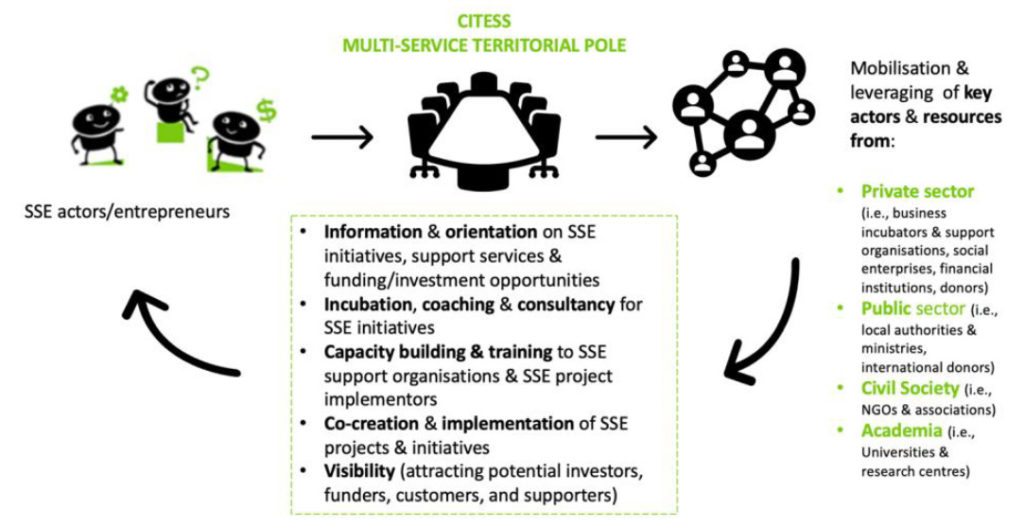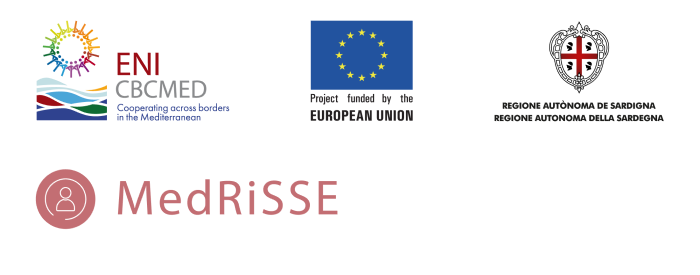Despite the potential of the SSE to promote more sustainable and inclusive local development through the creation of quality jobs that generate positive social and environmental impacts, the SSE is generally a diverse and very dispersed world, given the multiplication of actions and actors with similar purpose and operating in the same territory. This makes it necessary to create a common SSE territorial platform which pools together and catalysises the available public, private and civil society actors, resources and initiatives by fostering dynamics of mutual support and cooperation and promoting a common vision of sustainable local development. It is only through such strategic collaboration and solidarity that an enabling territorial ecosystem can be put in place in order to maximize the overall impact of local SSE actions.
For this reason, the CitESS methodology aims to foster an enabling, supportive and synergistic territorial ecosystem for the development of the local SSE through the creation of a virtual and/or physical multi-service territorial hub. The purpose of this hub is to facilitate an open space for multi-stakeholder dialogue and collaboration between key territorial actors for the co-production of support services that enable the creation and development of SSE enterprises for the benefit of the whole community.
The logic behind the model is that open dialogue and strategic collaboration among key multi-sector actors allows to catalyse and leverage available territorial resources to offer a higher quality, better integrated and more comprehensive support to local entrepreneurs. The idea of the territorial platform, therefore, is to offer a one-stop shop directly at the service of entrepreneurs which connects them to the system, service, network, or organisation that can meet their needs. CitESS pole (CitESS stands for ‘cité de l’économie sociale et solidaire’, i.e. ‘city of the social and solidarity economy’), therefore, brings together all existing local public structures already supporting local entrepreneurship, “pressures” new or existing entrepreneurial projects towards SSE principles (social and environmental objectives), and hooks such initiatives with other key territorial players and initiatives such as Universities, CSOs, and existing social enterprises already engaged in the local SSE.
Moreover, by its own collaborative nature, the CitESS model aspires to expand and connect with other multi-service territorial clusters in different regions to facilitate further cooperation and sharing of best practices, experience, skills, and resources.

The first experimentation of the CitESS model was carried out in the Governorate of Mahdia, Tunisia, a country which traditionally counts on a highly centralised administrative system and where the existing public structures supporting entrepreneurship (including SSE entrepreneurs) work in silos, each governed by separate Ministries following their own programs and strategies.
However, the original concept of the CitESS model goes back to 2013 when it was theorised by iesMed–a former European cooperative platform and member of the original MedRiSSE partnership based in Barcelona (Spain) for the promotion of the SSE in the Mediterranean–following the MedESS Forum.
The pilot, hence, were set up in order to:
- Support all forms of individual social entrepreneurship and collective solidarity entrepreneurship.
- Support a territorial dynamic of SSE and raise territorial awareness on the SSE concept and culture, notably through awareness-raising activities, SSE training and advocacy, sharing of project ideas inspired by national or Mediterranean cases, organization of SSE events, etc.
- Play an active role in SSE advocacy at the level of the legal framework but also at the level of funding lines and opportunities.
- Detect promising sectors for the SSE and SSE investment opportunities/ niches.
The main services offered by the CitESS pole to local SSE entrepreneurs and initiatives are the following:
- Information and orientation of entrepreneurs and SSE initiatives in order to support their access to legal support, existing training and coaching programmes, financing and SSE investment opportunities, networks, incubation spaces and other available support services that can respond to their needs.
- Incubation, coaching and consultancy for SSE entrepreneurs and actors.
- Capacity building and training for SSE support organisations (i.e. associations, Universities, vocational and incubation centres).
- Co-creation and implementation of SSE projects and pilot initiatives.

SSE practitioners, policymakers and local administrations searching for ways to improve the SSE in their own territories may consider replicating the CitESS model provided that key ingredients are in place and the process is well adapted to their specific context.
